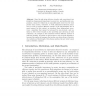14 search results - page 2 / 3 » Oblivious Transfer from Weak Noisy Channels |
STOC
1999
ACM
14 years 3 days ago
1999
ACM
Oblivious polynomial evaluation is a protocol involving two parties, a sender whose input is a polynomial P, and a receiver whose input is a value α. At the end of the protocol t...
CRYPTO
2005
Springer
14 years 1 months ago
2005
Springer
Since bit and string oblivious transfer and commitment, two primitives of paramount importance in secure two- and multi-party computation, cannot be realized in an unconditionally ...
CORR
2006
Springer
13 years 7 months ago
2006
Springer
Abstract. Oblivious transfer (OT) is a primitive of paramount importance in cryptography or, more precisely, two- and multi-party computation due to its universality. Unfortunately...
TCC
2004
Springer
14 years 1 months ago
2004
Springer
Quantum 2-party cryptography differs from its classical counterpart in at least one important way: Given blak-box access to a perfect commitment scheme there exists a secure 1−2...
CORR
2008
Springer
13 years 7 months ago
2008
Springer
We explore the capacity and generalized degrees of freedom of the 2-user Gaussian X channel, i.e. a generalization of the 2-user interference channel where there is an independent...

